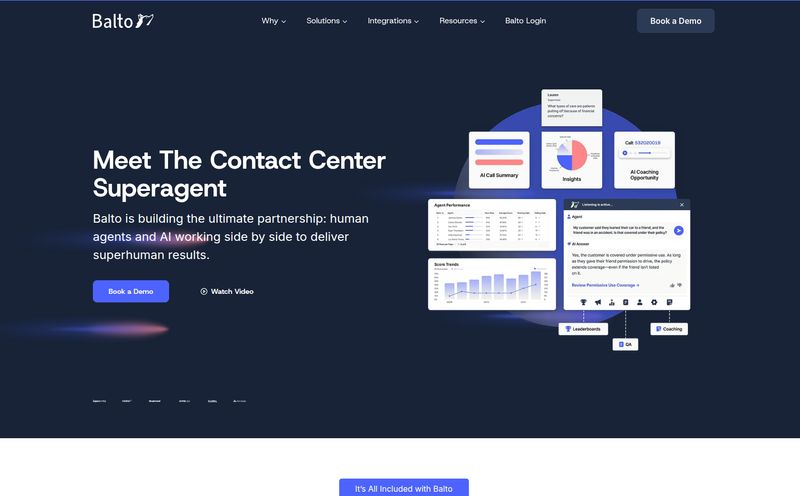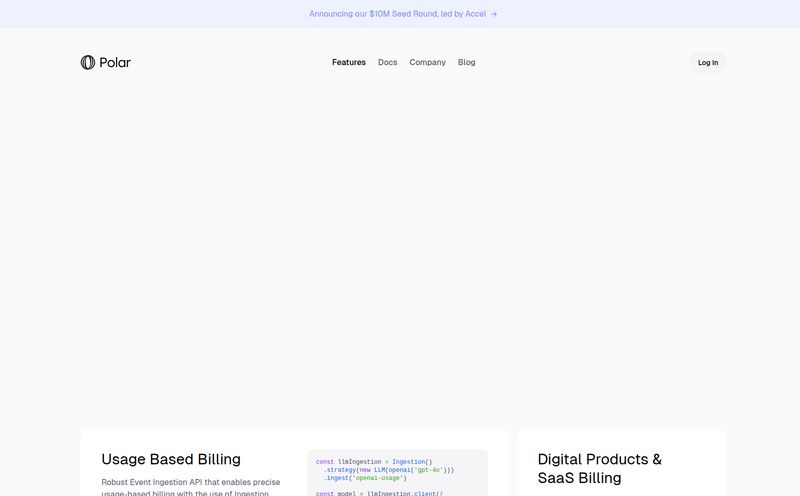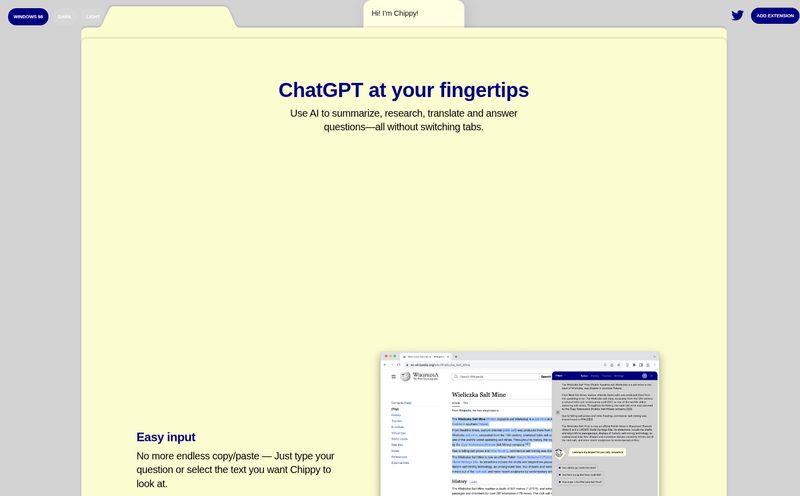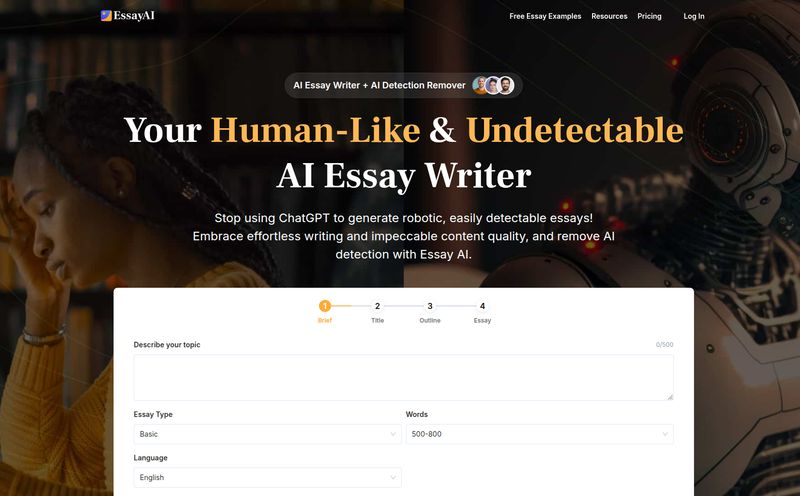We’ve all been there. You start with a simple search. Something like, “best content marketing strategies for 2024.” Benign enough, right? Three hours, 27 open tabs, and a half-read Wikipedia article about the history of banner ads later, you’re no closer to a finished blog post. You're just… lost. Drowning in a sea of blue links and disjointed information.
For years, this has been the accepted chaos of online research. We wrestle with search engines that give us a list, not context. We prod AI chatbots that give us a plausible-sounding answer but no sense of the bigger picture. It's like trying to assemble a jigsaw puzzle by looking at one piece at a time. It’s frustrating, inefficient, and frankly, a colossal waste of time.
So when I stumbled upon a new platform called SearchSaga, my inner SEO-nerd sat up and paid attention. The claim? To transform how we research complex topics, turning hours of work into minutes. A bold claim. One I’ve heard before. But this one… this one feels different.
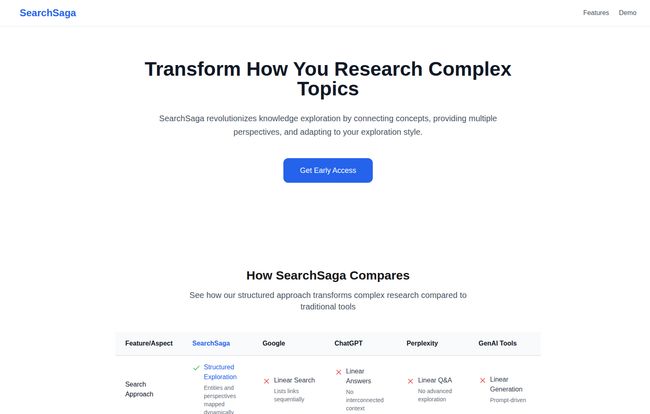
Visit SearchSaga
So, What is SearchSaga Anyway?
Let's get one thing straight: SearchSaga isn't just another search engine. Calling it that is like calling a Swiss Army knife a butter knife. It’s an intelligent topic exploration platform. Think of it less like a librarian who points you to an aisle and more like a museum curator who walks you through an exhibit, explaining how each piece connects to the next.
Instead of giving you a flat list of results, SearchSaga creates a dynamic map of the topic. It shows you the main concepts, the sub-topics, the different schools of thought, and how they all interrelate. It’s a visual, structured approach to understanding. You’re not just finding facts; you’re building a framework of knowledge in real-time. My first thought was, this is what I've wanted for building topical authority for years. Something that shows you the whole forest, not just a bunch of individual trees.
The Agony of Our Current Research Tools
Let’s be honest for a second. The tools we use are broken. Or at least, they weren’t built for the kind of deep, contextual understanding we need.
- Google Search: It’s a miracle of indexing, but it’s fundamentally a linear, link-based system. It’s designed to answer a specific query, not to help you explore a broad topic. You get a popularity contest, not a structured overview.
- AI Chatbots (like ChatGPT): Incredibly powerful for summarizing or generating text, but they often lack depth and context. They can hallucinate, and their knowledge is presented as a singular, authoritative block of text. There's no easy way to see alternative perspectives or question the 'why' behind the answer. It’s a conversation, not an exploration.
- Other AI Search Tools (like Perplexity): These are a step in the right direction, often providing citations. But they still often require iterative prompting and refinement. You have to keep asking questions to dig deeper, which is still a user-driven, time-intensive process.
We spend more time wrangling our tools than we do thinking. That’s the core problem SearchSaga seems to be tackling head-on.
How SearchSaga Aims to Change the Game
So, how does it actually work? Based on what I've seen, it boils down to three core ideas that really set it apart.
Intelligent Knowledge Mapping
This is the big one. When you search a topic, SearchSaga doesn't just spit out links. It analyzes the subject and generates a visual map of interconnected entities. For example, exploring “Electric Vehicles” might branch into nodes for Battery Technology, Charging Infrastructure, Market Leaders, and Government Subsidies. You can immediately see the key components of the topic and how they relate. It’s like having a brainstorming session with an expert who has already done all the pre-reading for you.
Seeing Things from Every Angle
Here’s where it gets really cool. The platform offers what it calls Multi-Perspective Analysis. Sticking with the Electric Vehicle example, you can instantly switch your view to see the topic through different lenses. Want the technical perspective? It will focus on motor types and battery chemistry. Curious about the economic side? It will shift to show you market trends, company valuations, and supply chain issues. This is a massive time-saver for anyone who needs a well-rounded understanding, from market analysts to students writing a thesis.
Explorer vs. Scholar: Your Two Research Hats
SearchSaga understands that not all research is the same. Sometimes you need a quick overview, and sometimes you need to go deep. It offers two modes for this:
- Explorer Mode: This is your 30,000-foot view. It gives you a comprehensive overview of a topic, perfect for getting up to speed quickly or understanding the basics.
- Scholar Mode: Time to put on your glasses and get serious. This mode is for the deep dive, offering more granular detail and in-depth connections for when you really need to become an expert.
This dual-mode approach is just smart. It acknowledges that the research process itself isn't linear, and our needs change as we learn more.
Let's See the Side-by-Side Comparison
The SearchSaga team put together a comparison chart that, I admit, is pretty bold. It takes direct aim at the big players. I've recreated it here with my own thoughts because it really crystallizes the platform's value proposition.
| Feature/Aspect | SearchSaga | ChatGPT | Perplexity | |
|---|---|---|---|---|
| Search Approach | Structured, multi-perspective. (This is the whole pitch.) | Linear, link-based. (We know this pain.) | Linear Q&A. (Good for answers, not exploration.) | Linear, iterative queries. |
| Entity Mapping | Automatically categorizes & structures insights. (The time-saver.) | No categorization. | No categorization. | No categorization. |
| Perspective Switching | Instant & supported. (The 'wow' feature, for me.) | None. | Requires complex prompting. | None. |
| Search Complexity/Reduction | Reduces hours to minutes instantly. | User-driven manual exploration. | Iterative refinement needed. | Constant prompting needed. |
Looking at this, the difference is clear. Traditional tools put the burden of synthesis on the user. SearchSaga does the heavy lifting of structuring information first, so you can spend your brainpower on analysis and insight, not just organization.
Who Is This Tool Really Built For?
The site lists the obvious candidates: Researchers, Students, Professionals, and Analysts. And yeah, that makes perfect sense. Anyone writing academic papers, market analysis reports, or just trying to pass a class would find this incredibly useful.
But I think the audience is bigger. As an SEO and content person, I see a huge application. Imagine being able to map out an entire topic cluster in minutes, understanding every user-intent-driven angle before you write a single word. Or think of a journalist on a deadline who needs to get smart on a complex issue, fast. Or a startup founder exploring a new market. The potential is massive for anyone whose job relies on quickly developing a deep, nuanced understanding of a topic.
The Not-So-Fine Print and Other Considerations
Alright, lets pump the brakes a little. No tool is perfect, especially one this new. There are a couple of things to keep in mind. First, SearchSaga is currently in a closed beta with an early access program. That means limited spots are available. You have to sign up and wait, which is a bit of a bummer when you're excited to try it.
Second, there's likely a bit of a learning curve. It’s a new way of thinking about search, and it might take a minute to get the hang of it and fully exploit all its features. This isn't a knock, just a reality of any powerful new tool. Finally, there's no public information on pricing yet. While I hope they have a generous free or entry-level tier, that remains to be seen. But for the chance to revolutionize my research workflow? I'm willing to be patient.
Frequently Asked Questions About SearchSaga
- What exactly is SearchSaga?
- SearchSaga is an intelligent topic exploration platform that organizes complex subjects into structured, easy-to-understand visual maps. It helps you see connections and multiple perspectives instead of just a list of links.
- How is SearchSaga different from Google?
- Google provides a linear list of ranked web pages based on your query. SearchSaga provides a structured, multi-dimensional map of the topic itself, focusing on the relationships between concepts, not just the popularity of pages.
- Can I use SearchSaga instead of ChatGPT?
- They serve different purposes. ChatGPT is great for generating text, summarizing content, or answering a direct question. SearchSaga is designed for exploration and understanding the full scope and different facets of a topic. You might use SearchSaga for research and then use ChatGPT to help write about what you discovered.
- Is SearchSaga free to use?
- Currently, SearchSaga is in an early access phase. You can sign up for a chance to join the beta program. Pricing for the full public release has not been announced yet.
- Who would benefit most from using SearchSaga?
- While it's built for researchers, students, and analysts, it's also incredibly valuable for content creators, SEOs, journalists, product managers, and anyone who needs to learn about complex topics quickly and thoroughly.
- How does the multi-perspective analysis feature work?
- It allows you to apply different 'lenses' to your topic map. For a topic like cryptocurrency, you could instantly toggle between a technical view (blockchain, hashing), an economic view (market caps, adoption rates), and a regulatory view (government policies, SEC rulings).
My Final Verdict on SearchSaga
I've been in the SEO and digital content world for a long time, and I've seen countless “next big things” come and go. It’s easy to get cynical. But I'm genuinely excited about the promise of SearchSaga. It addresses a fundamental pain point that every knowledge worker feels on a daily basis.
If it delivers on its promise of turning hours of frustrating research into minutes of structured insight, it won't just be a new tool. It'll be a new way of working. It could fundamentally change how we learn, how we build expertise, and how we create content. For now, I've signed up for early access, and I suggest you do too. This is one saga I definitely want to be a part of.
Reference and Sources
- SearchSaga Official Website
- Information Foraging: Why Google Makes Us Smarter by Nielsen Norman Group - An interesting read on the theory behind how we search for information online.
